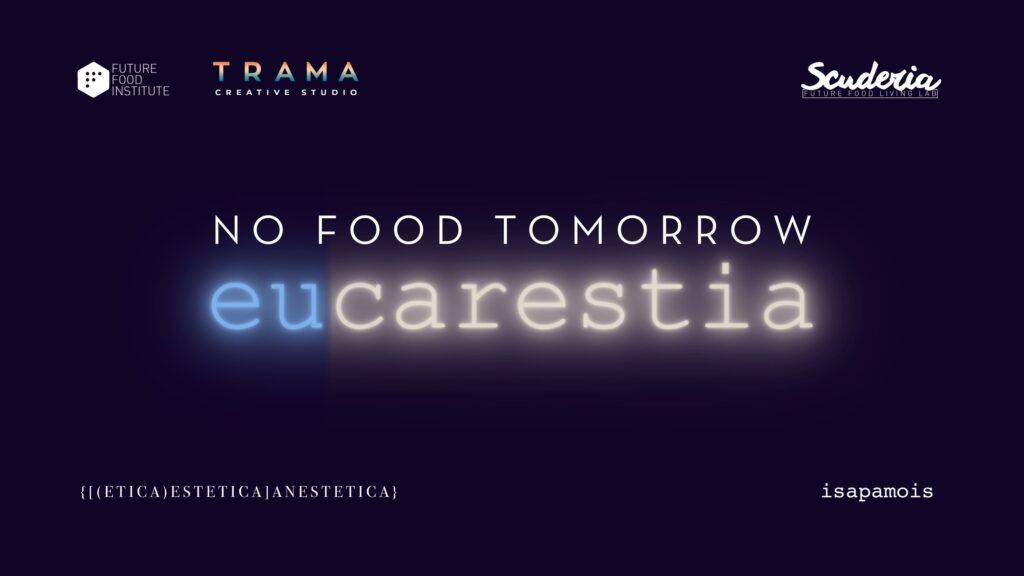Bologna, Scuderia Future Food Living Lab – Friday, Feb. 3 at 11:30 a.m. opens the exhibition No Food Tomorrow “EuCarestia” curated by the {[(ethical)aesthetic]anesthetic} collective with Isapamois.
On the occasion of Artefiera 2023, TRAMA e Future Food Institute present a contemplative and provocative installation, by the art collective {[(ethical)aesthetics]anesthetics}, to stimulate a critical dialogue on today’s essential issues such as global food security e il climate crisis that affects the Mediterranean basin and its heritage, threatening the loss of biodiversity. Issues that see Europe and its strategies (EU Green Deal and Farm To Fork) playing a crucial role.
The word, Eucharist, has been analyzed and broken down, to find its hidden meaning, and activate a reflection on the possibility of a famine in Europe.
The English artivist isapamois designed, to emphasize the word’s duplicity of meaning, a bi-color muraled that will illuminate piazza Verdi throughout the exhibition period.
The artistic collective {[(ethical)aesthetics]anesthetics} has created thanks to the expertise of TRAMA Creative Studio and the collaboration with the Department of Biology of the University of Padua a series of NFTs (non-fungible tokens) made under the microscope, of some basic foods of the Mediterranean diet that suffer from the loss of biodiversity and that likewise have a strong symbolic value in Christian culture: Oil, Wine, Wheat and Sea Water, all from the Municipality of Pollica, the guide of the coordination of the UNESCO Mediterranean Diet Emblematic Communities.
These NFTs, also representatives of the acronym No Food Tomorrow, are embedded within symbolically sacred architectures: a triptych of tabernacles, called NFTryptic, and a confessional, called coNFTessional.
“Sacred” elements, precious resources, symbols and rituals that must be preserved and handed down to future generations, tangible and intangible heritages and a unique ecosystem in the world the Mediterranean, which as Sara Roversi (President of the Future Food Institute) reminds us “was the first real internet of humanity, capable of connecting peoples, cultures, food, ideas.” A project that symbolically starts right from the heart of the Mediterranean, Pollica, cradle and Emblematic Community of the Mediterranean Diet, and Cilento, Elea-Velia, cradle of Western philosophical thought, where deep ecological consciousness is transformed into a perfect balance between man and nature. “This is why we chose to start our reflection from here, because all this cultural and natural heritage must be protected and safeguarded, but above all it can become a real platform for integral human formation that precisely from the essential values must start.”
André Guìdot founder of the art collective {[(ethics)aesthetics]anesthetics} and director of the installation highlights the importance of “Care” a pivotal element of “Mediterranean Living”: “Caring for something we take for granted and may not be in the future deserves contemplative effort. Food, religion, and art have the great power to wonder, amaze, and at the same time make us reflect. The deeper aesthetics of the nature of food, which emerged from the beautiful images obtained under the microscope, has abstract and mathematical value that elevates the image of food to art. We creatives have a social duty to contribute to the dialogue among those who can drive change.”
Speakers at the opening include:
Antonio Parenti, Head of the Representation of the European Commission in Italy
Sara Roversi, President, Future Food Institute
Luca Ferrua, Director of IL GUSTO of GEDI Group
Stefano Pisani, Mayor of Pollica, UNESCO Emblematic Community of the Mediterranean Diet
André Guìdot, Creative Producer at TRAMA Creative Studio, Founder of {[(ethical)aesthetics]anesthetics}
Don Andrea Ciucci, Secretariat of the Pontifical Academy for Life (Video)
Read Exibart
Watch the full video on Repubblica



Full video here: https://vimeo.com/mediatrama/eucarestia

